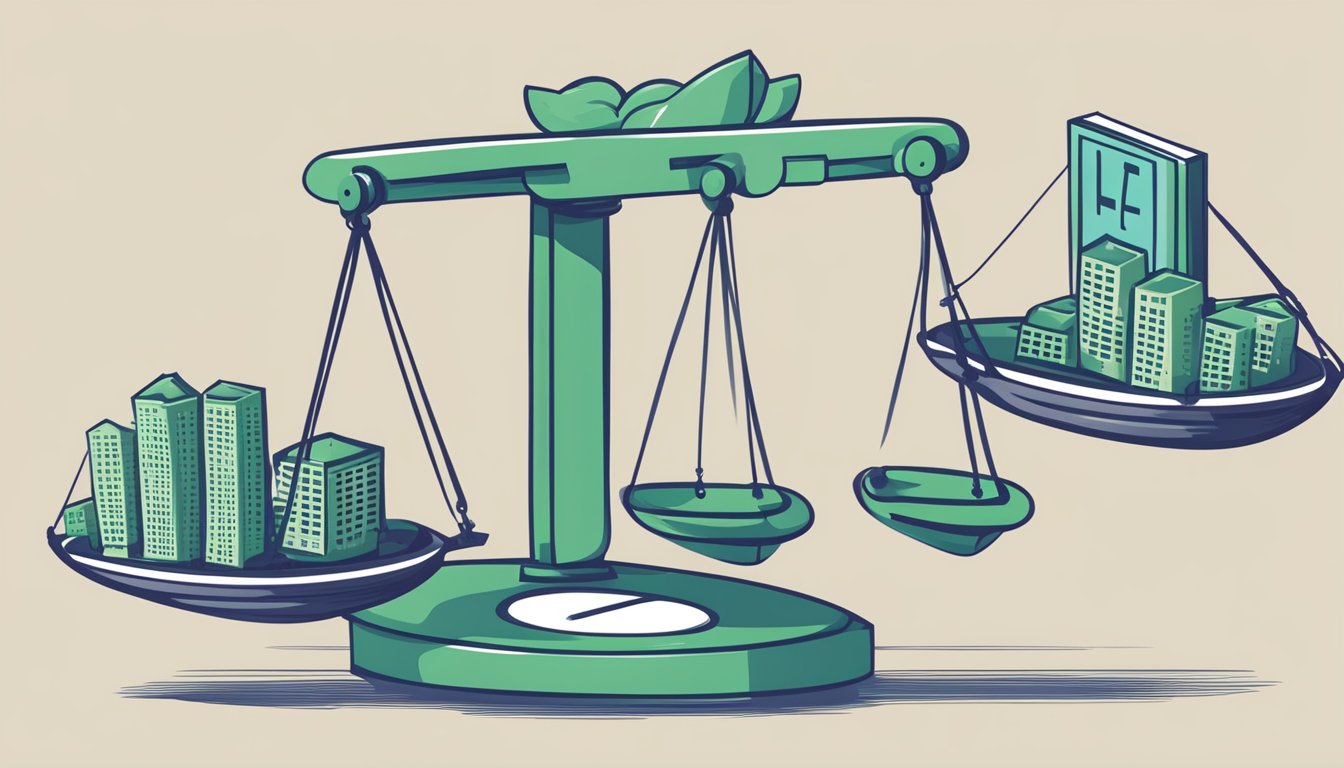Introduction:

If you’re planning to buy a house in Singapore, you have two options for financing: HDB loans and bank loans. Both have their advantages and disadvantages, and it’s important to understand the differences before making a decision. In this article, we’ll go over the basics of HDB loans vs bank loans in Singapore, so you can make an informed choice.
Understanding HDB Loans and Bank Loans:
HDB loans are offered by the government’s Housing and Development Board, while bank loans are offered by private banks. HDB loans are only available for the purchase of HDB flats, while bank loans can be used for both HDB flats and private properties. HDB loans have a fixed interest rate of 2.6% per annum, while bank loans have a variable interest rate that fluctuates according to market conditions.
Eligibility Requirements for HDB and Bank Loans:
To be eligible for an HDB loan, you must be a Singapore citizen or permanent resident and have a gross monthly income of less than $14,000. Bank loans have stricter eligibility requirements, and you’ll need to have a good credit score and a stable income. You’ll also need to have a higher down payment for a bank loan, usually around 20% of the property’s value.
Key Takeaways
- HDB loans are only available for the purchase of HDB flats, while bank loans can be used for both HDB flats and private properties.
- HDB loans have a fixed interest rate of 2.6% per annum, while bank loans have a variable interest rate that fluctuates according to market conditions.
- To be eligible for an HDB loan, you must be a Singapore citizen or permanent resident and have a gross monthly income of less than $14,000. Bank loans have stricter eligibility requirements, and you’ll need to have a good credit score and a stable income.
Understanding HDB Loans and Bank Loans

When it comes to financing your HDB flat, you have two main options: an HDB loan or a bank loan. Each option has its own set of advantages and disadvantages, so it’s important to understand the key differences before making a decision.
Key Differences
One of the key differences between HDB loans and bank loans is the interest rate. HDB loans have a fixed interest rate of 2.6% per annum, while bank loan interest rates fluctuate depending on the current SIBOR/SOR rates. This means that depending on the current market conditions, a bank loan can be either better or worse than an HDB loan.
Another important difference is the loan-to-value (LTV) ratio. The maximum LTV ratio for HDB loans is 90%, while the maximum LTV ratio for bank loans is 75%. This means that with an HDB loan, you can borrow up to 90% of the purchase price or valuation of the flat, whichever is lower. With a bank loan, you can borrow up to 75% of the purchase price or valuation of the flat, whichever is lower.
Pros and Cons
There are pros and cons to both HDB loans and bank loans. Here are some of the key factors to consider:
HDB Loans
Pros
- Lower downpayment: With an HDB loan, you only need to pay a downpayment of 10% of the purchase price, compared to 25% with a bank loan.
- Fixed interest rate: The interest rate for HDB loans is fixed at 2.6% per annum, which means you don’t have to worry about fluctuations in interest rates.
- No cash outlay: You can use your CPF Ordinary Account savings to pay for the downpayment, stamp duty, and legal fees, which means you don’t need to have cash on hand.
Cons
- Eligibility criteria: To be eligible for an HDB loan, you must meet certain criteria, such as income ceiling and citizenship requirements.
- Limited loan tenure: The maximum loan tenure for HDB loans is 25 years, which means you may have to make higher monthly repayments compared to a longer loan tenure.
- Limited loan amount: The maximum loan amount for HDB loans is $500,000, which may not be sufficient for some buyers.
Bank Loans
Pros
- Higher loan amount: With a bank loan, you can borrow up to 75% of the purchase price or valuation of the flat, whichever is lower. This means you may be able to borrow more than with an HDB loan.
- Longer loan tenure: The maximum loan tenure for bank loans is 30 years, which means you can spread out your repayments over a longer period of time.
- Flexibility: Bank loans offer more flexibility in terms of repayment options, such as partial prepayments and refinancing.
Cons
- Higher downpayment: With a bank loan, you need to pay a downpayment of 25% of the purchase price, compared to 10% with an HDB loan.
- Fluctuating interest rates: The interest rate for bank loans fluctuates depending on the current SIBOR/SOR rates, which means you may end up paying more in interest over time.
- Cash outlay: You need to have cash on hand to pay for the downpayment, stamp duty, and legal fees, as you cannot use your CPF Ordinary Account savings.
In summary, whether you choose an HDB loan or a bank loan depends on your financial situation, eligibility criteria, and preferences. It’s important to do your research and compare the options before making a decision.
Eligibility Requirements for HDB and Bank Loans

When it comes to financing your HDB flat, you have two options: a HDB loan or a bank loan. However, before you decide which loan to take, you need to check if you meet the eligibility requirements for each loan.
HDB Loan Eligibility
To be eligible for a HDB loan, at least one of the buyers must be a Singapore citizen. Additionally, you should not have taken two or more HDB loans previously. The property you owned last should not have been private, whether locally or overseas.
The HDB loan also has a monthly income ceiling. For families, the monthly income ceiling is S$14,000, while for extended families, it is S$21,000. For singles buying a resale 5-room (or smaller) flat or a new 2-room Flexi flat in a non-mature estate, the monthly income ceiling is S$7,000.
Bank Loan Eligibility
If you are not eligible for a HDB loan, you can consider taking a bank loan. To be eligible for a bank loan, you need to meet the bank’s eligibility criteria. Banks will consider factors such as your credit score, income, and employment status when assessing your eligibility.
Unlike HDB loans, bank loans are not restricted to Singapore citizens. However, banks may have their own property eligibility criteria. For example, some banks may not finance the purchase of certain types of properties, such as HDB flats with less than 60 years of lease remaining.
In conclusion, it is important to understand the eligibility requirements for both HDB and bank loans before deciding which loan to take. While HDB loans are limited to Singapore citizens and have a monthly income ceiling, bank loans are more flexible and may have their own property eligibility criteria.
Financial Implications and Costs

When it comes to taking out a loan for your HDB flat, it is important to consider the financial implications and costs involved. Here are some key factors to keep in mind:
Interest Rates and Repayments
One of the most significant factors to consider when choosing between a HDB loan and a bank loan is the interest rate. HDB loans have a fixed interest rate of 2.6%, which has remained unchanged since 1999. In contrast, bank loans usually have lower interest rates, but they are subject to fluctuations based on market conditions.
When it comes to repayments, HDB loans have a consistent repayment amount, while bank loans have fixed rates that are only valid for a certain period of time, usually 2 to 3 years. After that, the interest rates and monthly instalments may increase, which can make it difficult to budget and plan for the future.
Downpayments and Loan Amounts
Another important factor to consider is the downpayment and loan amounts. HDB loans require a downpayment of 10% of the flat’s purchase price, which can be paid using your CPF Ordinary Account (OA) savings. Bank loans, on the other hand, require a downpayment of 25% of the flat’s purchase price, which can be paid using your CPF OA savings or cash.
When it comes to the minimum and maximum loan amounts, HDB loans have a minimum loan amount of $10,000 and a maximum loan amount of 90% of the flat’s purchase price. Bank loans, on the other hand, have a minimum loan amount of $100,000 and a maximum loan amount of 75% of the flat’s purchase price.
It is also important to note that early repayment penalties and late payment fees may apply to both HDB loans and bank loans. Therefore, it is essential to read the terms and conditions carefully and ensure that you understand all the costs involved before making a decision.
In summary, choosing between a HDB loan and a bank loan involves weighing up the pros and cons of each option. While HDB loans offer stable interest rates and consistent repayments, bank loans may offer lower interest rates and more flexibility in terms of downpayments and loan amounts. Ultimately, the decision will depend on your individual financial situation and priorities.
Loan Features and Flexibility

When it comes to choosing between an HDB loan and a bank loan, one of the most important factors to consider is the loan features and flexibility. In this section, we’ll explore some of the key differences between the two types of loans.
Fixed vs Floating Interest Rates
One of the main differences between HDB loans and bank loans is the type of interest rate they offer. HDB loans come with a fixed interest rate, which means that the interest rate remains the same throughout the loan tenure. On the other hand, bank loans offer both fixed and floating interest rates.
Fixed interest rates provide stability and predictability in your monthly repayments, which can be beneficial if you prefer to have a stable interest rate. However, they may not be suitable if market fluctuations cause interest rates to drop significantly.
Floating interest rates, on the other hand, are subject to market fluctuations and may change over time. They can be beneficial if interest rates drop, but they can also be risky if interest rates rise significantly.
Loan Tenure and Refinancing Options
Another important factor to consider is the loan tenure and refinancing options. HDB loans come with a maximum loan tenure of 25 years, while bank loans can have a tenure of up to 35 years.
HDB loans also offer more flexibility when it comes to refinancing. If you take up an HDB loan, you have the option to refinance to a bank loan at any time without any lock-in period. However, if you take up a bank loan, you cannot refinance to an HDB loan.
In addition, HDB loans allow you to make early repayments without any penalty, which can help you save on interest charges. Bank loans, on the other hand, may charge a penalty for early repayment.
When it comes to refinancing options, both HDB loans and bank loans offer various packages such as fixed rate packages, floating rate packages, and fixed deposit home rate (FHR) packages. The interest rates for these packages are based on different benchmarks such as the Singapore Offered Rate (SOR), Singapore Interbank Offered Rate (SIBOR), and Singapore Overnight Rate Average (SORA).
Overall, when choosing between an HDB loan and a bank loan, it’s important to consider your financial situation, preferences, and future plans. While HDB loans offer more stability and flexibility, bank loans may offer lower interest rates and longer loan tenures.
Impact of Personal Preferences and Market Conditions

Choosing the Right Loan for Your Lifestyle
When it comes to choosing between an HDB loan and a bank loan, your personal preferences and lifestyle play a significant role. If you are someone who prefers stability and predictability, then an HDB loan might be the right choice for you. With a fixed interest rate of 2.6%, you can be assured that your monthly instalments will remain the same throughout the loan tenure. On the other hand, if you are someone who values flexibility and wants to take advantage of market conditions, then a bank loan might be a better option. Bank loans typically have a lower interest rate than HDB loans, but they are subject to market fluctuations.
Adapting to Economic Changes
It is essential to keep an eye on market conditions when choosing between an HDB loan and a bank loan. The Monetary Authority of Singapore (MAS) regulates the interest rates for HDB loans, which means that they are relatively stable and predictable. However, bank loans are subject to market valuation and can be affected by economic changes. In times of economic uncertainty, interest rates may rise, making bank loans less attractive. It is crucial to keep an eye on market conditions and adapt your loan accordingly.
Your credit score is also an essential factor to consider when choosing between an HDB loan and a bank loan. Financial institutions use your credit score to determine your creditworthiness and the interest rate you qualify for. If you have a good credit score, you may be eligible for a lower interest rate on a bank loan. However, if your credit score is poor, you may not be eligible for a bank loan at all.
In conclusion, choosing between an HDB loan and a bank loan depends on your personal preferences and market conditions. If you prefer stability and predictability, an HDB loan might be the right choice for you. However, if you want to take advantage of market conditions and value flexibility, a bank loan might be a better option. Keep an eye on market conditions, adapt to economic changes, and consider your credit score when making your decision.
Frequently Asked Questions

What are the advantages of choosing an HDB loan over a bank loan for purchasing a flat?
One of the advantages of choosing an HDB loan over a bank loan is that the downpayment required is lower. With an HDB loan, you only need to pay a minimum downpayment of 10%, while a bank loan requires a minimum downpayment of 25%. Additionally, HDB loans have a fixed interest rate, which means that you don’t have to worry about fluctuations in interest rates.
How does the interest rate for an HDB loan compare with that of a bank loan in Singapore?
The interest rate for an HDB loan is generally lower than that of a bank loan in Singapore. As of 2024, the interest rate for an HDB loan is 2.6%, while the interest rate for a bank loan can range from 1.5% to 2.5%. However, it’s important to note that the interest rate for a bank loan can fluctuate over time, while the interest rate for an HDB loan is fixed.
Can you convert your bank loan to an HDB loan at a later stage after purchasing your home?
No, you cannot convert your bank loan to an HDB loan at a later stage after purchasing your home. Once you have taken out a bank loan, you are committed to that loan for the duration of the loan tenure.
What are the eligibility criteria for securing an HDB loan?
To be eligible for an HDB loan, you must be a Singapore citizen or a permanent resident. You must also be at least 21 years old and have a stable source of income. Additionally, you must not own any other properties in Singapore or have taken out any other housing loans from HDB.
What are the differences in downpayment requirements between HDB loans and bank loans?
The downpayment required for an HDB loan is generally lower than that of a bank loan. With an HDB loan, you only need to pay a minimum downpayment of 10%, while a bank loan requires a minimum downpayment of 25%. However, it’s important to note that the downpayment required for both types of loans can vary depending on the purchase price of the flat.
How do the loan tenure options differ between HDB loans and bank loans?
The loan tenure options for HDB loans and bank loans differ slightly. With an HDB loan, the maximum loan tenure is 25 years, while with a bank loan, the maximum loan tenure can be up to 35 years. However, it’s important to note that the loan tenure for both types of loans can vary depending on factors such as your age and income.




